Related Research Articles
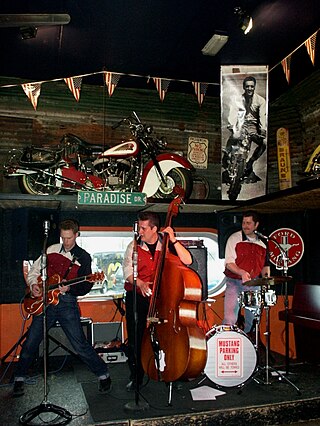
Rockabilly is an early style of rock and roll music. It dates back to the early 1950s in the United States, especially the South. As a genre, it blends the sound of Western musical styles such as country with that of rhythm and blues, leading to what is considered "classic" rock and roll. The term "rockabilly" itself is a portmanteau of "rock" and "hillbilly"; the latter is a reference to country music that contributed strongly to the style. Other important influences on rockabilly include western swing, boogie-woogie, jump blues, and electric blues.

"Honey Don't" is a song written by Carl Perkins, originally released on January 1, 1956 as the B-side of the "Blue Suede Shoes" single, Sun 234. Both songs became rockabilly classics. Bill Dahl of Allmusic praised the song saying, "'Honey Don't' actually outclasses its more celebrated platter-mate in some ways." It has been covered by more than 20 other artists, including the Beatles, Ronnie Hawkins and Johnny Rivers. The song has appeared in the films Prince of Tides, Diner, and Perfect Sisters.

It Don't Get Any Better Than This is an album by American country music singer George Jones released on April 7, 1998, on the MCA Nashville label.

I Lived to Tell It All is an album by country music artist George Jones, released on August 13, 1996, on the MCA Nashville Records label. It was also a companion piece to his best-selling autobiography of the same name, I Lived to Tell It All.

The Bradley Barn Sessions is a duet album released in 1994 by American country music artist George Jones.
"Running Bear" is a teenage tragedy song written by Jiles Perry Richardson and sung most famously by Johnny Preston in 1959. The 1959 recording featured background vocals by George Jones and the session's producer Bill Hall, who provided the "Indian chanting" of "uga-uga" during the three verses, as well as the "Indian war cries" at the start and end of the record. It was No. 1 for three weeks in January 1960 on the Billboard Hot 100 in the United States and the same on Canada's CHUM Charts. The song also reached No. 1 in the UK Singles Chart and New Zealand in 1960. Coincidentally, "Running Bear" was immediately preceded in the Hot 100 No. 1 position by Marty Robbins' "El Paso", and immediately followed by Mark Dinning's "Teen Angel", both of which feature a death of, or affecting, the protagonist. Billboard ranked "Running Bear" as the No. 4 song of 1960. The tenor saxophone was played by Link Davis.
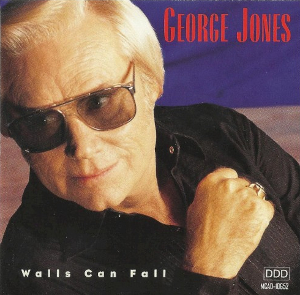
Walls Can Fall is an album by American country music artist George Jones. This album was released in 1992 on the MCA Nashville Records. It peaked at number 24 on the Billboard Country Albums chart and number 77 on The Billboard 200 chart. Walls Can Fall went Gold in 1994.

Every Time Two Fools Collide is a 1978 duet album by American country music singers Kenny Rogers and Dottie West.
Hargus Melvin Robbins, known by his nickname "Pig", was an American session keyboard player, having played on records for many artists, including Patsy Cline, Dolly Parton, Connie Smith, Patti Page, Loretta Lynn, Kenny Rogers, George Jones, Charlie Rich, Bob Dylan, Neil Young, J.J. Cale, John Hartford, John Stewart, Mark Knopfler, Alan Jackson, Merle Haggard, Roger Miller, David Allan Coe, Moe Bandy, George Hamilton IV, Sturgill Simpson, Conway Twitty, Ween,and Al Hirt. He was blind, having poked himself in the eye with a knife at age three.

"Dang Me" is a song by American country music artist Roger Miller, and 1964's Grammy Award winner for Best Country & Western Song. It was Miller's first chart-topping country hit and first Top Ten pop music hit, whose "jazzy instrumental section" helped make it "the quintessential example of Miller's lighthearted humor, which brought him many more hits."
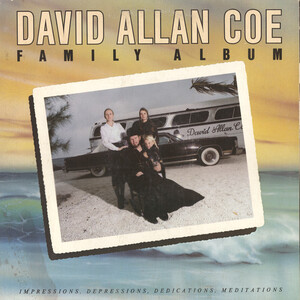
Family Album is an album released by country musician David Allan Coe. It was released in 1978 on Columbia.

Burn Your Playhouse Down – The Unreleased Duets is the 60th and final studio album by American country music singer George Jones released on August 19, 2008 on the Bandit Records label. It features duets never before released, including some that were cut from his 1994 duets album The Bradley Barn Sessions. The only new recording in the collection is "You And Me And Time", a song Jones recorded with his daughter by Tammy Wynette, Georgette. A music video accompanied the song. The album features several duets with artist from outside the country music pantheon, including Mark Knopfler, Leon Russell, and Keith Richards. The album peaked at number 15 on the Billboard country albums chart. Of the album's title track, Andrew Meuller of Uncut opined in July 2013, "The segue from Richards trying to sing like Jones to Jones actually singing like Jones is hilarious."

I Wanta Sing is an album by country singer George Jones. It was released in 1977 on the Epic record label.

Faded Love is a compilation album released by American country music artist, Patsy Cline. The album was released in 1988 under MCA Records and was produced by Allen Reynolds and Don Williams. It was the second compilation MCA released in 1988.

Patsy Cline is an EP released by American country music singer, Patsy Cline on August 14, 1961. It Cline's third EP to be released.
"Walk on By" is a song written by Kendall Hayes and performed by American country music artist Leroy Van Dyke. It was released in June 1961 as the first single and title track from the album Walk On By. The song was Van Dyke's most successful single, spending 37 weeks on the country chart and a record-breaking 19 at the number-one position. "Walk on By" crossed over to the pop chart peaking at number five, and was named by Billboard magazine, in its 100th anniversary issue (1994), as the biggest country music record in history.
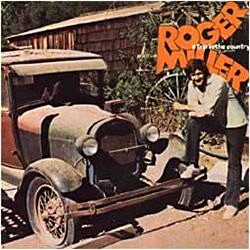
A Trip in the Country is the 11th album by American country music singer-songwriter Roger Miller. It reached No. 23 in the US Country Music chart. For the sleeve notes he wrote:

Blue & Lonesome is a compilation album by American country music artist George Jones released in 1964 on the Mercury Records label.

Live at Dancetown U.S.A. is a live album by American country music artist George Jones. It was recorded in 1965 but was not released until 1987.
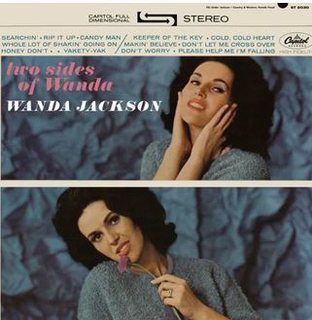
Two Sides of Wanda is a studio album by American recording artist Wanda Jackson. It was released in March 1964 via Capitol Records and contained 12 tracks. It was the sixth studio release of Jackson's career; side one contained rockabilly performances, while side two featured country music selections. The album received a nomination from the Grammy Awards following its release and has since been re-released.
References
- ↑ Jones, George (1997). I Lived To Tell It All. Dell, Inc.
- ↑ Allen, Bob (1996). George Jones: The Life and Times of a Honky Tonk Legend. St Martin's Press. p. 126. ISBN 978-0312956981.
- ↑ "Hargus "Pig" Robbins Highlights Country Music Hall of Fame Programs". Cybergrass. April 19, 2007. Archived from the original on January 16, 2011. Retrieved May 21, 2008.
- ↑ "Frenchie Burke Bio | Frenchie Burke Career | CMT". Archived from the original on 2017-04-09. Retrieved 2017-04-08.
- ↑ Whitburn, Joel (2004). The Billboard Book Of Top 40 Country Hits: 1944-2006, Second edition. Record Research. p. 179.
- ↑ "The Hot 100 Chart". Billboard.com. Retrieved 26 April 2021.